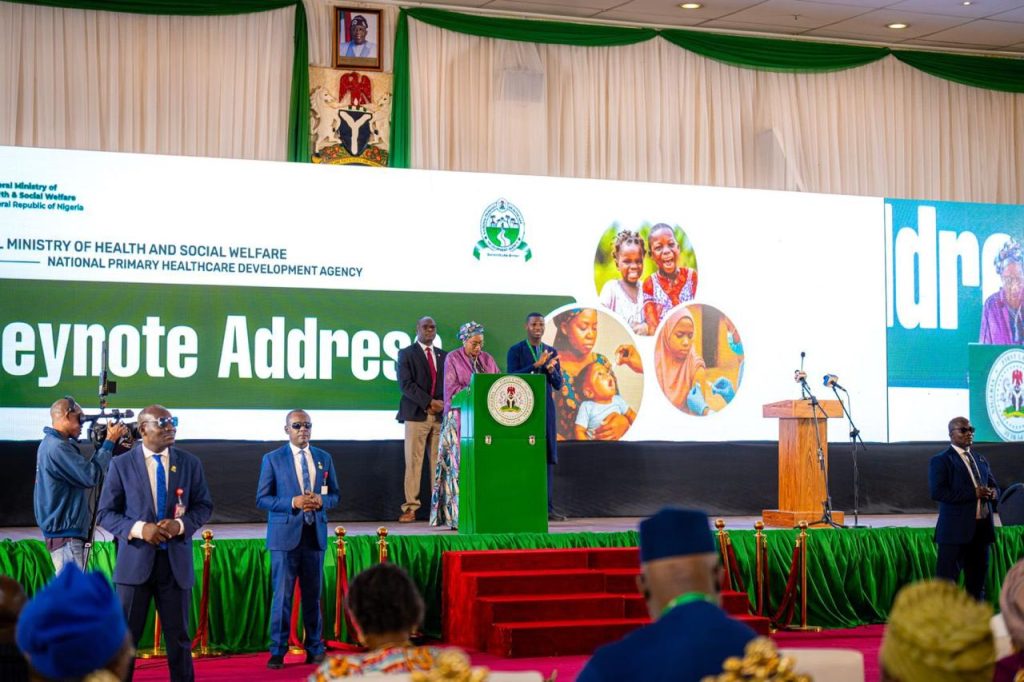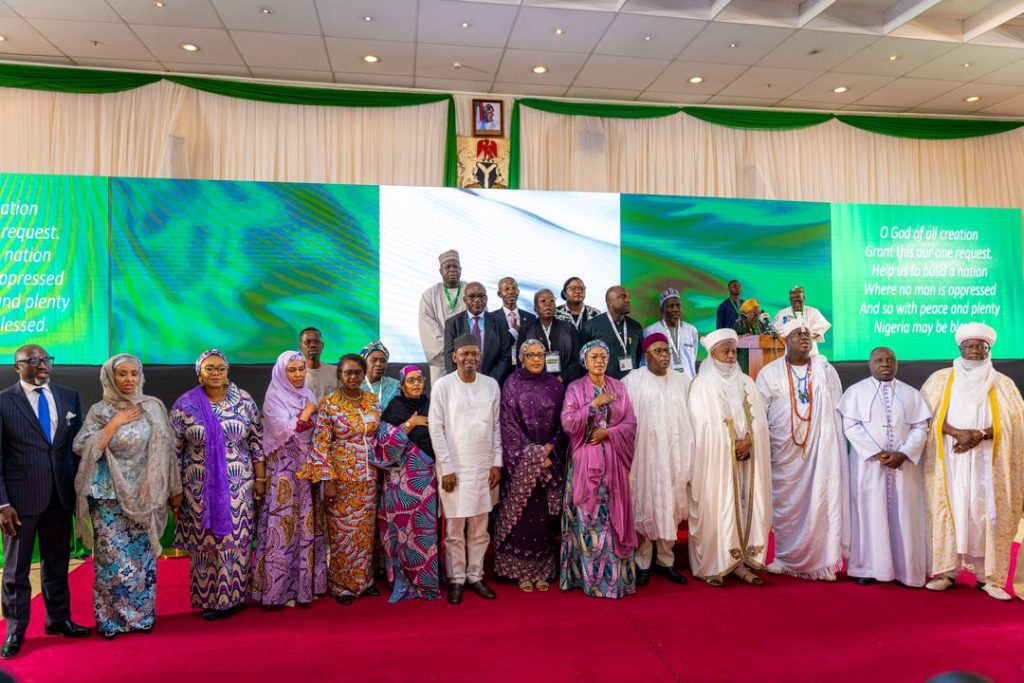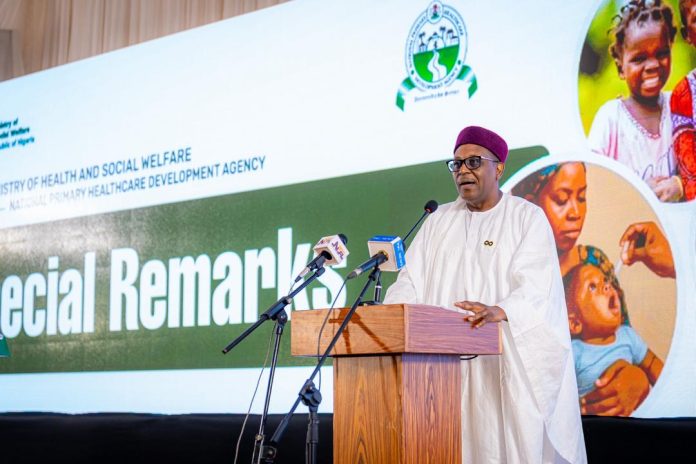Nigeria has launched Africa’s largest integrated health campaign, aimed at protecting over 100 million children with vital vaccines and treatments.

The ambitious nationwide initiative, flagged off by the First Lady, Senator Oluremi Tinubu (CON), in Abuja, on Monday 6 October 2025; combines multiple disease interventions, measles, rubella, polio, human papillomavirus (HPV), malaria, routine immunizations, and treatments for neglected tropical diseases (NTDs), into one harmonized campaign aimed at reaching every Nigerian child.

The campaign is being coordinated by the Federal Ministry of Health and Social Welfare, through the National Primary Health Care Development Agency (NPHCDA), in line with President Bola Ahmed Tinubu’s Renewed Hope Agenda, which places health at the centre of Nigeria’s human capital development and national renewal drive.
The First Lady, Senator Oluremi Tinubu, who officially declared the campaign open, reaffirmed her personal commitment to championing women’s and children’s health.
She called on Nigerians to rally behind the effort, emphasizing that collective participation is key to achieving universal coverage.
The First Lady described the flag-off as “a declaration of our collective resolve as a nation to say ‘No More’ to the diseases that rob our sons and daughters of their future.”
She noted that measles and rubella remain among the leading causes of blindness, disability, and child mortality, adding that rubella infections during pregnancy can result in blindness, deafness, or congenital heart defects in unborn children.
According to her, the initiative aligns with President Bola Ahmed Tinubu’s Renewed Hope Agenda, which prioritizes giving every Nigerian child a healthy start in life and ensuring that no mother dies while giving birth.
“A vaccine in a vial does not save a child. A vaccine in a clinic does not protect a community. Protection only becomes real when that vaccine is injected into the arm of a child,” she emphasized, urging mothers to take their children for vaccination and fathers to actively support the effort.
Speaking at the national flag-off, Coordinating Minister of Health and Social Welfare, Professor Muhammad Ali Pate, described the campaign as “a historic moment for Nigeria’s health system,” adding that it represents one of the largest coordinated public health efforts on the African continent, and possibly, anywhere in the world.
“This is not just a vaccination campaign. It is about reimagining how we deliver health services to our people, ensuring that no one, no community, and no child is left behind,” Pate said.
The Minister emphasized that the campaign reflects President Tinubu’s commitment to rebuilding trust in public institutions through healthcare delivery that reaches the most vulnerable.
“The President is healing the nation, unifying our people through health, and inspiring confidence that Nigeria can deliver for its citizens,” he added.
Pate commended the First Lady for her strong advocacy for women and children’s health, describing her as “a mother to the nation” whose personal involvement in immunization, cervical cancer prevention, and maternal health programmes continues to strengthen national health outcomes.
Highlighting the Tinubu administration’s achievements in the health sector, Prof. Pate revealed that primary health care utilization in Nigeria has increased from 10 million visits per quarter in 2023 to 47 million in the second quarter of 2025, reflecting growing confidence in the system.
He also stated that more than 15,000 women have benefited from the Free Emergency Obstetric Care Initiative, introduced under the Renewed Hope Agenda, while hundreds of thousands are enrolled under the Mothers and Babies Implementation (MaMi) Programme, a maternal care initiative providing comprehensive support during pregnancy and childbirth.
“Through the President’s leadership, our health system is being rebuilt from the ground up. We are expanding functional primary health centres, improving health worker motivation, and increasing insurance coverage to give families peace of mind,” Pate said.
The campaign, supported by key development partners, including UNICEF, WHO, Gavi, the Vaccine Alliance, and the Bill & Melinda Gates Foundation, has been hailed as a model for integrated service delivery across Africa.
Pate extended appreciation to Nigeria’s traditional and religious leaders, including His Eminence, the Sultan of Sokoto, and the Ooni of Ife, for their grassroots advocacy in promoting immunization and public health over the years.
He also called on state governors, commissioners for health, and local government chairpersons to take ownership of the campaign, ensuring accountability and active supervision in their respective states.
“Every governor must be seen leading this effort, flagging off campaigns, mobilizing communities, and ensuring that no child is missed,” he charged.
“Vaccines are safe, effective, and save lives. No parent who understands their value would deny a child the chance to be protected,” Pate urged.
He further cautioned Nigerians against misinformation about vaccines, stressing the importance of truth and science in safeguarding children’s health.
“Together, we will save lives, prevent suffering, and build a stronger, healthier Nigeria,” Professor Pate added.
The National Primary Healthcare Development Agency NPHCDA Executive Director, Dr. Muyi Aina, in his welcome address, said the campaign, described as “the mother of all health campaigns”,was designed to close immunity gaps, interrupt disease transmission, and improve uptake of essential vaccines and treatments.
He noted that the campaign will be rolled out in two phases:
Phase 1: Begins immediately in the 19 northern states, the Federal Capital Territory, and Oyo State.
Phase 2: Scheduled for January to February 2026, covering the southern states.
Dr. Aina disclosed that all 36 states and the FCT have reported measles outbreaks this year, with 10,783 cases and 76 deaths, primarily among unvaccinated children. He warned that rubella, often underreported, continues to cause serious birth defects in unborn children of infected mothers.
“This integrated campaign is about more than vaccines,it’s about protecting futures, building resilient communities, and ensuring that every child in Nigeria has a fair chance to live and thrive,” Aina stated.
As the integrated health campaign begins across the country, it signals a major step in the government’s broader goal of Health for All Nigerians, a promise that transcends politics, ethnicity, or geography, but unites the nation in a shared vision of a healthier future.













